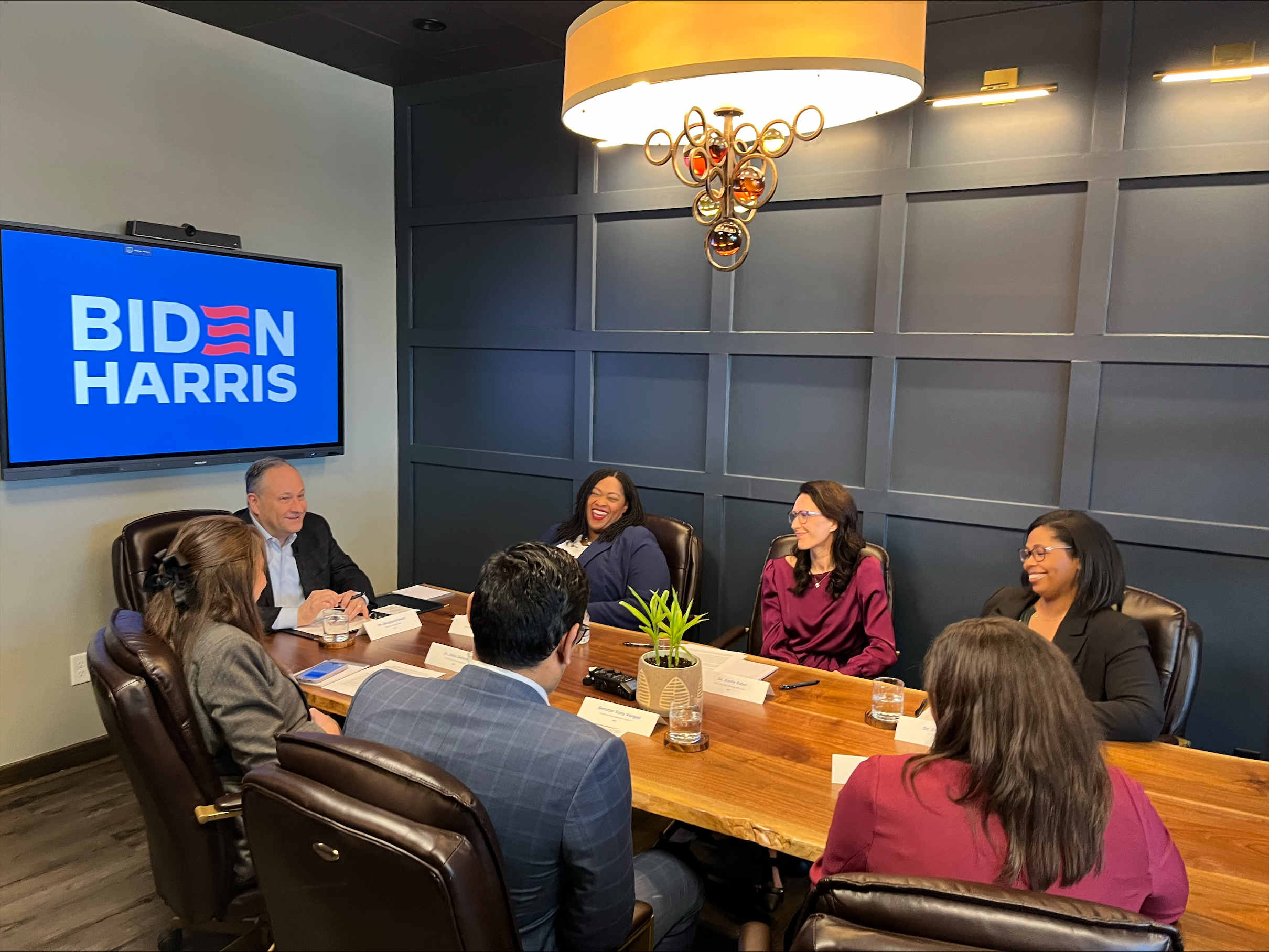Meeting with the Second Gentleman, Doug Emhoff
Last month Drea Jones, MD spoke with Second Gentleman Doug Emhoff at a roundtable event about the importance of safeguarding reproductive health. Dr. Jones is a member of our Reproductive Well-Being Shared Learning Collaborative, one of six place-based teams who are committed to building a system of support for reproductive well-being in their regions or communities. What follows are her remarks at the event in full:
"I am honored to be part of this panel of Omaha leaders and to have the opportunity to meet with the Second Gentleman about critically important health-related issues that affect not merely individual patients, but, quite literally, whole communities. Let me say at the outset that I am here to share my personal perspectives based on my experience and I am not representing my employer.
I grew up in Omaha and am now an Associate Professor in the Department of Family Medicine at UNMC. As a family physician practicing in North Omaha, I serve a population that is overwhelmingly African American and disproportionately poor.
I am also the medical director for the Girls Inc Health Center, an innovative partnership that empowers young women and girls, the overwhelming majority are youth of color who come from economically disadvantaged backgrounds. In fact, we are the only Girls Inc in the country with an on-site clinic.
In addition, I serve as the physician representative on the Douglas County Board of Health.
I am also part of the Shared Learning Collaborative with Power to Decide, a national organization committed to reproductive well-being. Our Omaha team uplifts the work of IBBG (I Be Black Girl), Nebraska’s only reproductive justice organization, whose advocacy efforts address abortion access, affordable childcare, extending postpartum coverage, and natural hair protections.
From my professional experiences working on the frontlines of health care, I can see clearly that when we protect women’s fundamental rights and have in place robust reproductive health policies that are comprehensive, inclusive, and fully funded, the outcomes for individual patients, as well as families and the broader community, improve. Conversely, when we erode these policies, overturn women’s fundamental right to autonomy over their bodies, undermine equitable access to high-quality health services, and unnecessarily insert the government between doctors, patients, and their health care decisions, the outcomes deteriorate with consequences that ripple far beyond the immediate health concern.
The 2022 overturn of Roe vs Wade has needlessly exacerbated the bigger and longer-standing issues of persistent racial and economic inequality in America’s health system. The same communities of color and economically distressed communities that are disproportionately affected by bans and restrictions are communities that were already struggling to make ends meet and who faced systemic barriers long before 2022. The current assault on women’s rights and reproductive health is simply adding insult to injury.
I’d also like to share that, in addition to my professional work, I am a mother of two incredible pre-teen daughters. And, from that perspective, I lament that they are growing up in an America where they have FEWER rights and LESS freedom than I did and that, as Black women, their chances of facing complications, including death, surrounding childbirth, are INCREASING. Certainly, the current situation makes addressing that maternal health crisis in communities of color much harder.
These professional and personal experiences lead me to support those in leadership who are committed to defending our fundamental rights, expand access to quality health care, generally, and reproductive health, specifically, for all Americans, particularly those from historically marginalized communities like the one I come from and serve.
As such, it is critical that the next administration share these commitments. I am grateful for President Biden and Vice President Harris’s commitment to these values, as well as their dedication to keep fighting by passing federal legislation that protects reproductive health access in every state. Fundamental rights, like women’s autonomy and reproductive justice, should not be based on the happenstance of political geography in America. The alternative this fall is deeply concerning and we can’t let that happen.
Thank you."



